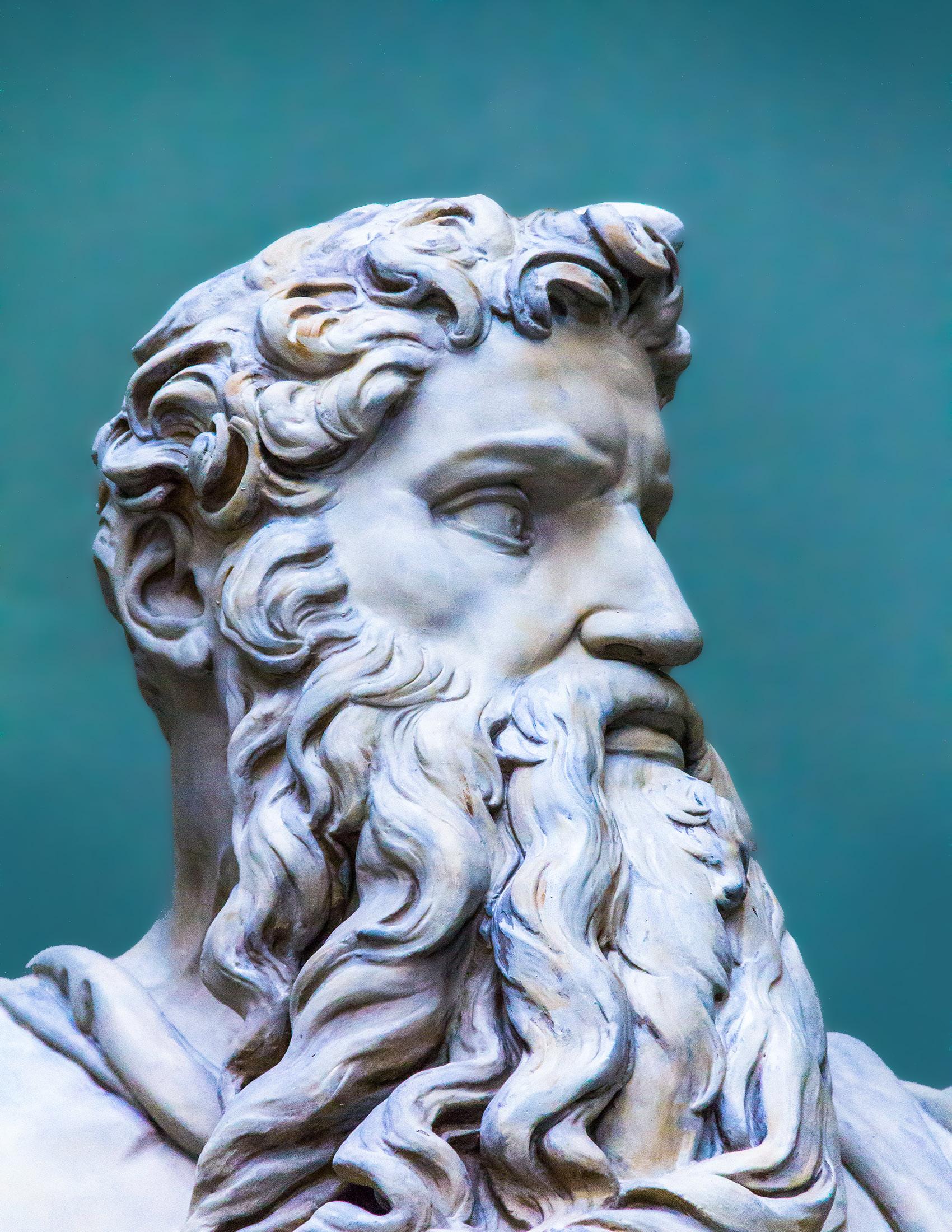






VOL. XXI NO. 13 — MAY 19, 2023 PARSHA &Energies Powers Does Bible Say they Exist? RABBI MOSHE BEN-CHAIM Miracle Tablets Why Wri en on Both Sides? ____________ DANI ROTH Road to Freedom ____________ RABBI REUVEN MANN Israel& Idolatry ____________ RABBI MOSHE BEN-CHAIM Moses: e Greater Teacher RABBI ISRAEL CHAIT
FREE
Just click any icon in this issue





2 | WWW.MESORA.ORG MAY 19, 2023
the
–––––––––––––––––––––––––
THE JOURNAL ON TORAH THOUGHT
| Please send letters and questions to: Comments@Mesora.org
3 Greater Teacher
RABBI ISRAEL CHAIT
An apparent redundancy in Rashi reveals an important educational lesson.
5 Road to Freedom
RABBI REUVEN MANN
Independence was not for itself, but for a greater objective.
6 Energies/Powers


RABBI MOSHE BEN-CHAIM
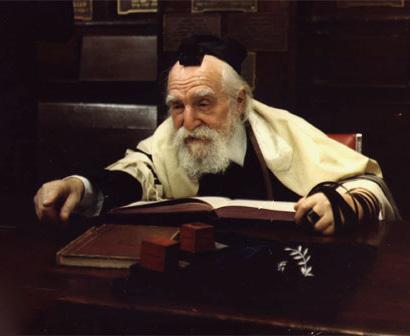
Unexamined beliefs & rabbis’ words lead to imagining what’s no real.

13 Miracle Tablets
DANI ROTH
Shavuos celebrates Torah. But why were the Tablets constructed with a miraculous design?
14 Idolatry & Israel
RABBI MOSHE BEN-CHAIM & HOWARD SALAMON
The prophets o er keen insight into destructive notions.
15 Don’t Count the Levites
RABBI ELIEZER BARANY
What may be derived from separating the Levites?
“Whomever occupies himself with the Torah for its own sake, merits many things; not only that but he gives worth to the whole world. He is called a beloved friend; one that loves God; one that loves humankind; one that gladdens God; one that gladdens humankind. And the Torah clothes him in humility and reverence, and prepares him to be a tzaddik...” (Avos 6:1)
Note that he is only "prepared" to become a tzaddik (righteous person). Why is he not "immediately" a tzaddik, as he is immediately “clothed in humility and reverence?” is is because a tzaddik is not de ned by individual, discreet acts. He does not achieve the status in a mere moment. A tzaddik is not one who perfected himself in a singular area. A tzaddik is one who is perfect in all aspects of his personality, and perfect in all his relations, as Rashi says (Avos 6:1) "He walks perfectly." God too uses the same language telling Abraham, "Walk before Me and be perfect" (Gen. 17:1). "Walking" in a certain path (philosophy) refers not to an individual action, but to an ongoing lifestyle. erefore, Pirkei Avos says that one who learns with no ulterior motive, has the proper preparation in order to become a tzaddik, but he is not a tzaddik yet. A tzaddik earns that title only a er expressed perfection in every aspect of his personality and lifestyle, which can only be achieved over much time.
The Greater Teacher
These are the children of Aaron and Moses, on the day that God spoke with Moses on Mount Sinai (Num. 3:1).
As Moses’ children are not mentioned, Rashi explains why Aaron’s sons fill the capacity of Moses’ “children”:
Whomever teaches his friend's son Torah, it is considered as if he bore his friend’s son
The very next Rashi says:
Aaron's o spring were rendered as his (Moses') own, since Moses taught them what he learned from God's mouth.

Subscriptions are free. To subscribe, send any email to join@mesora.org We invite feedback at comments@mesora.org
Articles may be reprinted without consent of the Jewishtimes or the authors, provided the content is not altered and credits are given. WWW.MESORA.ORG MAY 19, 2023 | 3 MESORA
PARSHA
(CONT. ON NEXT PAGE)
RABBI ISRAEL CHAIT wri en by a student
These two Rashis seem redundant. What is the unique message of each one?
Though my father and mother abandoned me, the LORD will take me in
At the time of intercourse, the parents’ intent was for their own pleasure. Once they completed their pleasure, he turned his face to You and she turned her face
Why should we honor parents? Rashi says parents gratified their instinctual urges, and that’s why a child exists. As parents intended to satisfy themselves, why should this demand honor from the child? They did not intend their intercourse to benefit a child, but only to satisfy their desires. This is the meaning of “my parents abandoned me”: although not yet existing during intercourse, the child is “as if” abandoned, since during intercourse, the parents paid no attention to the child-to-be, but only to their instinctual protected the drop [semen] and created the The embryo’s life is due to God. Thus, honoring parents—honoring that institution that generates life—must target honoring God, who is the true cause. That is why the command to honor parents is placed in the first of the two tablets, which address man’s relationship with God. One might think honoring parents belongs on the second tablet that addresses interpersonal laws. But God—not parents—is the
As honoring parents targets honoring God, one who teaches Torah to his friend’s son plays the true “parental” role: he causes the son to honor God in a far greater measure than the biological parent. The teacher fills the truer parental capacity that biological parents intend to fill: to imbue the son with honor for God. This is the meaning of the first Rashi: “Whomever teaches his friend's son Torah, it is
Aaron's o spring were rendered as Moses' own, since Moses taught them what he learned from God's mouth.
This second Rashi must teach something new; Rashi isn’t redundant. Moses’ education of Aaron’s sons elevated them in manner that eclipsed Aaron’s education. When a person thinks, he relates to God. Moses imbued Aaron’s sons with a level of thought higher than what Aaron taught them. While Aaron provided the necessary foundation for his son’s knowledge of God, Moses elevated them to a higher degree. It is proper to say that the sons’ degree of knowledge of God is due to Moses, in a manner unrelated to Aaron’s education. It was Moses alone who brought Aaron’s sons to the higher level of knowledge of God they now attained. In this manner, Aaron’s sons were now rendered as solely Moses’ sons. The second Rashi says, “they were rendered as his own,” unlike the first Rashi that says, “Moses bore them.” Rashi is precise.
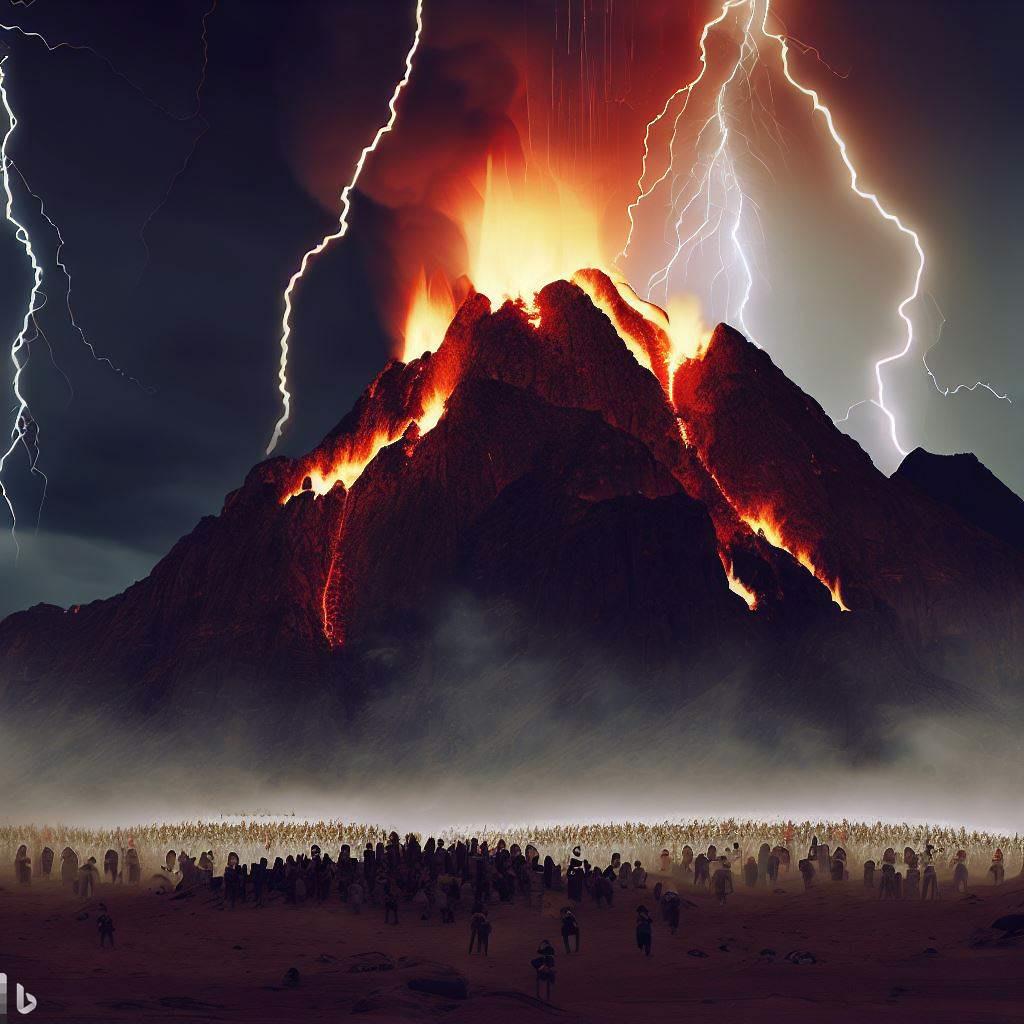

As Moses taught Torah to Aaron’s sons, he shared with Aaron the role as a parent. That’s the first Rashi. But as Moses’ education surpassed Aaron’s education of his sons, Moses now functioned as the “sole provider” of that elevated knowledge of God. In this capacity, Aaron’s sons were no longer his, but solely Moses’ own creation. Aaron played no role in the higher level his sons attained due to Moses’ education. ■

4 | WWW.MESORA.ORG MAY 19, 2023
SHARE
Long Road to Freedom
his week’s Parsha, Bamidbar, initiates the fourth Book of the Torah, which goes by that name. It must be emphasized that the goal of the Exodus was not simply to terminate the enslavement of the Jews. Many people are attracted to the Holiday of Passover because they mistakenly believe that it celebrates the goal of human freedom. However, that, in and of itself, is not a Torah ideal.
Freedom is simply a condition of existence in which one may live as he pleases. But what if he chooses to pursue goals that are antithetical to the true purpose of man? Many people have destroyed their lives because they misused their freedom of action. Unfortunately, there was no one to restrain them from gratifying their base and destructive instincts. This was certainly not why Hashem took the Jews out of
The purpose of the Exodus was to transform the Jews into a unique People who would be the teachers of fundamental Torah truths to the entire world. Thus, upon leaving Mitzrayim (Egypt) the former slaves did not immediately go to the “Promised Land” to “chill” and enjoy their newfound leisure. There was a long and arduous road ahead of them. Hashem did not spare them the harsh conditions of the Wilderness or the fear of Pharaoh’s retaliation.

When the Jews saw the armies of Pharaoh bearing down on them, they went into full panic mode. Apparently, the plagues which had devastated Egypt were not su cient to convince them that matters were completely under Hashem’s control. It was only after they witnessed the Egyptians dead on the banks of the sea that “they believed in Hashem and His

The Midbar (Desert) was a transitional phenomenon, not like Egypt from which they had emerged nor like Canaan, the land that Hashem had designated for them. The chief challenge was; to fully divest themselves of their inclination to be slaves and dependent on the dole. True, as slaves they groaned and chafed from the crushing labors, but if certain reasonable adjustments would be made they could adapt to that lifestyle. Note that when Pharaoh withdrew provision of the straw for bricks, thereby increasing the workloads on the slaves beyond their capacity, the Jews appealed to the King in a respectful and beseeching manner. They could make peace with their predicament, if only it were a bit more tolerable. And even after leaving Egypt, they continued to entertain the fantasy of a “return”.
Shortly after exiting Egypt, at the Yam Suf (Reed Sea), certain factions were thinking of a return to
Pharoh. Comparisons between the “dire” conditions of the Midbar and those they had enjoyed under Pharaoh were never far from their thoughts. When the people had a craving for meat and were tired of the Manna they put it this way; “We remember the fish that we ate in Egypt free of charge; the cucumbers, melons, leeks, onions and garlic. But now our life is parched, there is nothing; we have nothing to look forward to but the Manna” (Bamidbar 11:5-6).
The Jews complained a great deal in the Wilderness; about the water, the Manna, the insu cient meat and the fact that Canaan was inhabited by powerful people. In response to the command to conquer Eretz Yisrael (the Land of Israel) the people called for appointing a leader who would bring them back to Mitzrayim. Apparently, these people preferred to exist under the merciless rule of Pharaoh rather than the sovereignty of Hashem.
The desire to return and cling to the place of one’s degradation is very compelling. There needs to be an understanding that getting out of Egypt was not an end in itself, but rather the gateway to a new destination. Thus, on the second night of Pesach we initiate the unique and long-lasting Mitzvah of “Counting the Omer”. We proceed to count the days and weeks which culminate on the fiftieth day on which we celebrate Shavuot, Zman Mattan Torateinu (the time of the giving of the Torah).
This e ectuates a bridge between the holiday of the Exodus and that of the Revelation, which constituted the purpose of the emigration from Egypt. Says the Rambam; “The Feast of Weeks is the anniversary of the Revelation on Mt. Sinai. In order to raise the importance of this day, we count the days that pass since the preceding festival, just as one who expects his most intimate friend on a certain day counts the days and even the hours. This is the reason why we count the days since the o ering of the Omer, between the anniversary of the departure from Egypt and the anniversary of the Lawgiving. The latter was the aim and the object of the exodus from Egypt, and thus G-d said, ‘I brought you unto myself’” (Exodus 19:4). Guide For The Perplexed Part 3 ch. 43.
Our concept of freedom is not merely that of political independence. It is rather that the soul must be liberated from the worship of false gods and corrupt ideologies. As we ponder the Torah and elevate ourselves into the world of truth and righteous behavior, we become free and holy people and form the nation that is destined to be the “Kingdom of Priests and Holy People”. May we merit to attain it.
Shabbat Shalom. ■
PARSHA SHARE WWW.MESORA.ORG MAY 19, 2023 | 5
Rabbi Reuven Mann
Energies & Powers
RABBI MOSHE BEN-CHAIM
A new king arose over Egypt who did not know Joseph. And he said to his people, “Behold, the Israelite people are much too numerous for us. Let us deal shrewdly with them, lest they increase and in the event of war they may join our enemies in fighting against us and leave the land.”
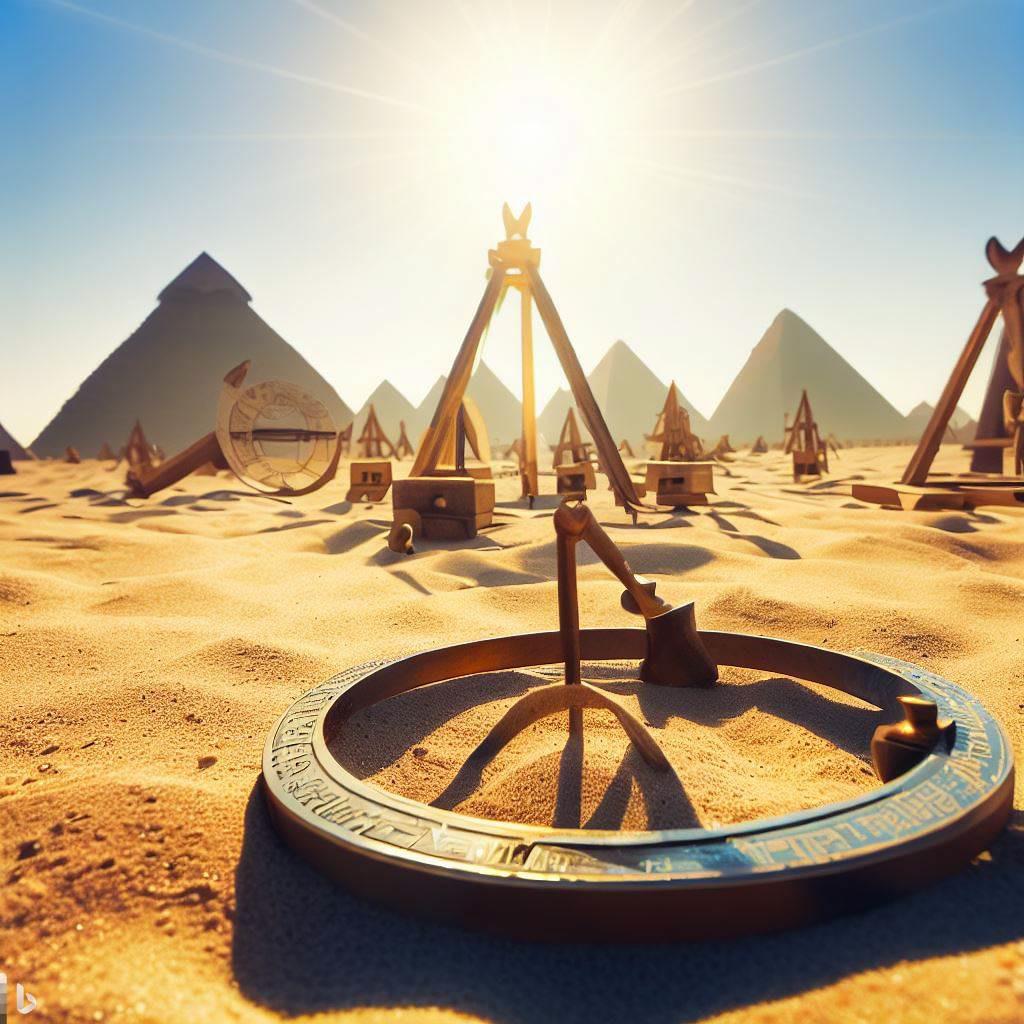
The king of Egypt spoke to the Hebrew midwives, one of whom was named Shiphrah and the other Puah saying, “When you deliver the Hebrew women, look at the birth stool: if it is a boy, kill him; if it is a girl, let her live” (Exod. 1). (CONT. ON NEXT PAGE)


6 | WWW.MESORA.ORG MAY 19, 2023 UNIVERSE SHARE
Pharaoh felt threatened by Israel’s numbers. However the midwives disobeyed Pharaoh’s decree to kill the newborn males.
And it was, as the midwives feared God, and he made houses for them (Exod. 1:21).
Pharaoh built houses for the midwives to keep a closer eye on their suspicious behavior (Malbim). But Pharaoh did not yet switch his decree from killing the males on the birth stool; this decree continued in place. Then, Pharaoh suddenly changed his decree:
Then Pharaoh charged all his people, saying, “Every boy that is born you shall throw into the Nile, but let every girl live” (Exod. 1:22).
Why did Pharaoh change his decree from killing the newborns on the birth stool, to drowning them in the Nile River? Rashi answers:
Regarding the Egyptians too, Pharaoh made a decree (Sotah 12a). For on the day when Moses was born his astrologers
said to him, “Today their deliverer has been born, but we know not whether he is born of an Egyptian father or of an Israelite; but we see by our astrological art that he will ultimately su er misfortune through water.” Pharaoh therefore made a decree that day regarding the Egyptians also, as it is said here, “Every son that is born [you shall cast into the river]”, and it is not stated “[every son] who is born to the Hebrews”. The astrologers however, were not aware that Moses was ultimately to su er misfortune through the waters of Meribeh and not through the waters of the Nile.
Rashi makes it sound as if the astrologers got it partially right: Moses would su er through some water calamity. But we need not credit the astrologers at all…
Why didn’t the astrologers suggest drowning the males when Pharaoh first expressed his concern about the Jews’ population explosion? If the astrologers truly had objective knowledge of Moses’ fate, they should have shared it with Pharaoh when he first expressed his concern
about the growing Jewish population. That they did not, indicates that they were merely reacting to Pharaoh’s growing worries, and they were not in possession of any knowledge. The astrologers reacted because they desperately sought to protect their positions. To do so, they must maintain their value. But without o ering new advice regularly, they lose value and risk their posts, or death. This is why they continued to o er changing forecasts of a “savior”, and then later added that this savior was “born today,” and then that “he will die by water.” By providing new predictions, they sustained their value to Pharaoh, thereby protecting their posts. People in political positions don’t get there by accident…they desire power and strive to maintain their positions.
Foreknowledge?
Man cannot know the future, as human knowledge is “observational,” and the future is not yet in existence to observe! The astrologers were liars. Foreknowledge does not exist: not for humans today nor back then.

Some are of the opinion that Torah commentators (Rashi) are always literal. However, this fallacy is put to rest through King Solomon's book Proverbs (Mishlei) which should truly be titled “Metaphors.” Also, Maimonides’ son Abraham (among others) shared that the rabbis spoke in metaphor. Our Rashi too is metaphor or allegory. Others believe there was such a thing as black magic, but this, too is exposed as a lie, as we see that the astrologers and magicians could not reproduce Lice, or remove Boils from their bodies. As Saadia Gaon states, Pharaoh’s magicians and astrologers were merely adept at sleight of hand, like any magician today. Thus, they could not manipulate things small like lice they could not control nature (Boils).
Rashi clearly says that the astrologist did not know that Moses would ultimately su er through the waters of Meribeh. This means the astrologers were lying. They didn’t get it “partially” right. They knew nothing of the future like all men, and it was mere coincidence that their lie of Moses’ getting punished through water correlated to the waters of Meribeh.
Rashi Knew the Astrologers Lied
“On the day when Moses was born Pharaoh’s astrologers said to him, ‘Today their savior has been born.’”
The astrologers were not prophets, and astrology is false. How then does Rashi imply they knew Moses’ day of birth? The answer is those are not Rashi’s words, but rashi is voicing the claim of the astrologers that, “Today the savior is born.”
SHARE WWW.MESORA.ORG MAY 19, 2023 | 7
(CONT. ON NEXT PAGE)
Rashi (Exod. 2:3) says that Moses’ mother Yocheved hid Moses from the Egyptians for 3 months after his birth. Now, had the astrologers been correct that they knew which day Moses was born, they would have stopped killing infants after Moses’ birth date; as they had killed all infants born on that day including the savior! However, the fact that Yocheved hid Moses was because the astrologers had not yet told Pharaoh, “Today the saviors is born.” Had they already told this to Pharaoh, the murder of infants would cease, and Yocheved would not need to hide Moses. Thus, the astrologers lied when they told Pharaoh “The savior is born today.” Yocheved hid Moses because the astrologers had not yet suggested the savior’s birth date had arrived. Moses was born before the date the astrologers said that he was born. Even if Rashi is taken literally, this argument exposes the astrologers as liars. Consider this: God planned Moses’ birth and existence to carry out His will. Therefore, it is nonsensical to suggest that God shared Moses’ birth date (via astrology) with those intent on murdering him. God did not allow the astrologers know when Moses was born. The astrologers were liars.
Rashi Cites Allegory, not Fact
We don’t know of the conversations between Pharaoh and his astrologers. Rashi is citing the rabbis’ scripted allegory depicting the astrologers’ deceitful methods: they created self-fulfilling prophecies that appealed to Pharaoh. They did not know that years later Moses would su er from the waters of Meribeh. But the rabbis who lived after that event did know. So when they wrote this allegory cited by Rashi, the rabbi’s intent was to unveil the methods the astrologers followed: they lied to Pharaoh saying “Moses’ end will be through water, so let’s make certain he dies, by drowning all new borns.” This Rashi means that the astrologers fabricated an astrological strawman fairytale which they knew Pharaoh would buy into due to his worries o ering a 100% solution to placate Pharaoh’s fears, thereby maintaining their positions: “Pharaoh, the savior will su er through water, so let’s drown the infants to actualize the prediction.” ■

8 | WWW.MESORA.ORG MAY 19, 2023 SHARE

WWW.MESORA.ORG MAY 19, 2023 | 9 SHARE WWW.MESORA.ORG MAY 19, 2023 | 1 3 Designers of the Jewishtimes & Mesora.org Building loyalty and sales through design strategies 516.569.8888 NYDesign.com Branding UI/App Design Wires/Prototypes App Store Design Dataviz/Charts Infographics Iconography Illustration Websites Landing Pages Editorial Design Presentations Social Media Advtg/Promo Animation Packaging WEBSITE
Discover a side of the Bible you never knew existed. Here is a fresh perspective on some of the most lurid, perplexing, and downright fascinating tales in the Bible – stories that are often skipped over in school because they are so di cult to teach. Delve into lesser known details of David and Batsheba's a air. The shocking relationship between Lot and his daughters. Tamar's scandalous seduction of her father-in-law. The tumultuous love a air between Samson and Delilah. But this is not a sensationalized retelling of ancient myths. It is a critical analysis of these narratives through a contemporary lens, weaving together extensive knowledge of tradition and scholarship with a touch of humor.
Challenge your assumptions about what the Bible is and what it has to o er. Don't miss out on the stories that teachers were too afraid to tell you.



Kindle, hardcover and paperback formats. Click below:

Buy on Amazon
1 0 | WWW.MESORA.ORG MAY 19, 2023 SHARE
NEW BOOK: by JESSIE FISCHBEIN
Jessie Fischbein has a great fondness for the nuances in Biblical text and commentaries. She lives with her husband and children in Far Rockaway, within walking distance of her grandchildren and a beautiful beach, which she visits often. She also loves doing backflips and handsprings.
What is the purpose of gematria?

Can we truly learn anything from the numerical representation of words?
What is beneath these creative yet apparently simplistic interpretations?

While jointly pursuing semichah and a PhD in mathematics, it seemed natural for Elie Feder to love gematria. However, he was bothered by these compelling questions. That is, until he discovered the purpose of gematria.
Gematria Refigured presents the discoveries that led to the author’s transformation from a gematria skeptic to a gematria lover. It develops a theory which elucidates how the Torah and Chazal use gematria to direct us toward a very specific type of idea. Through its many examples, this work illustrates how gematria can help us uncover novel insights, while providing interesting and clearly formulated perspectives into many mitzvos, themes, and stories in Tanach.
Buy on Amazon
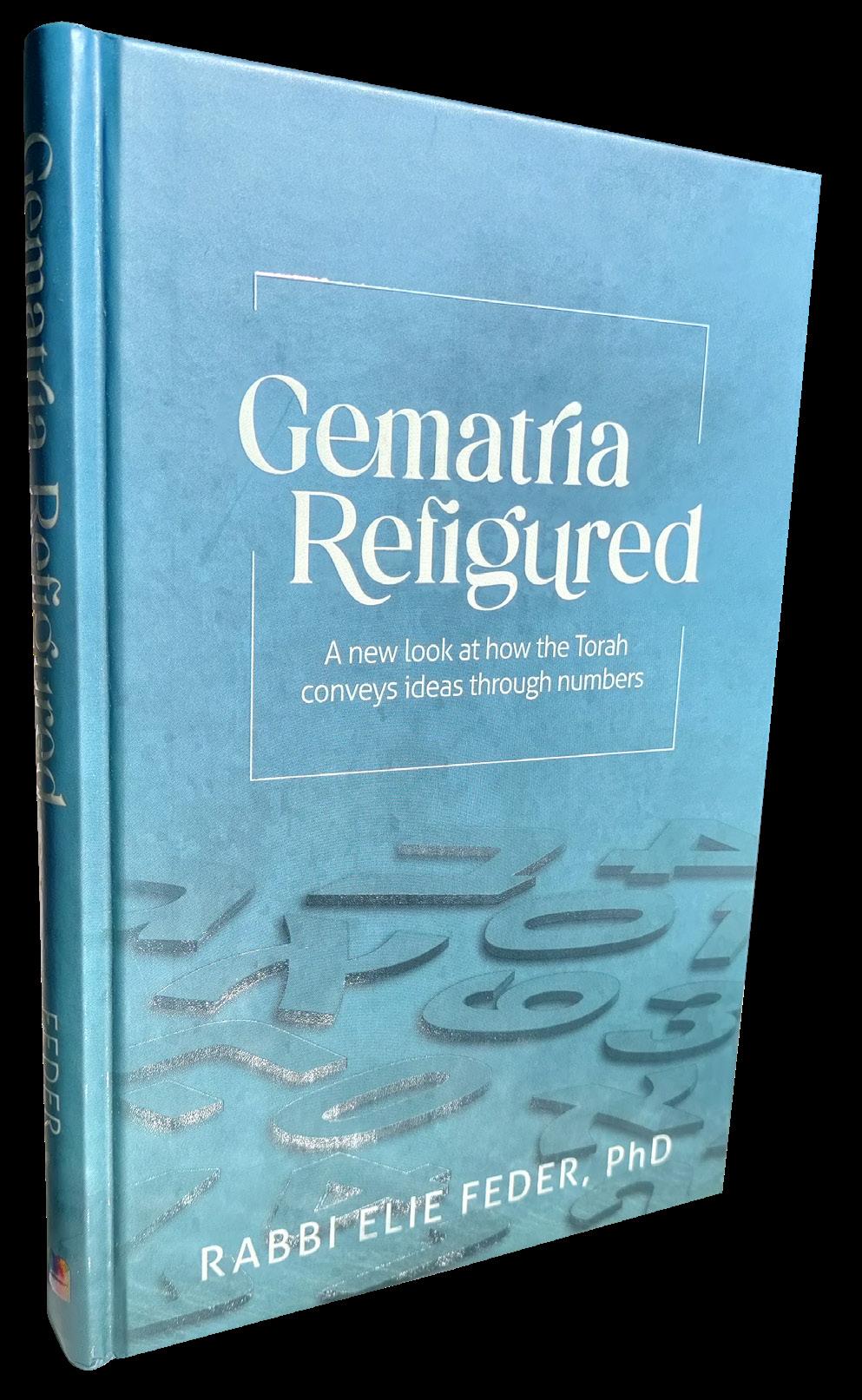
Gematria is a polarizing topic. While many love it, many others view it with skepticism.
WWW.MESORA.ORG MAY 19, 2023 | 1 1

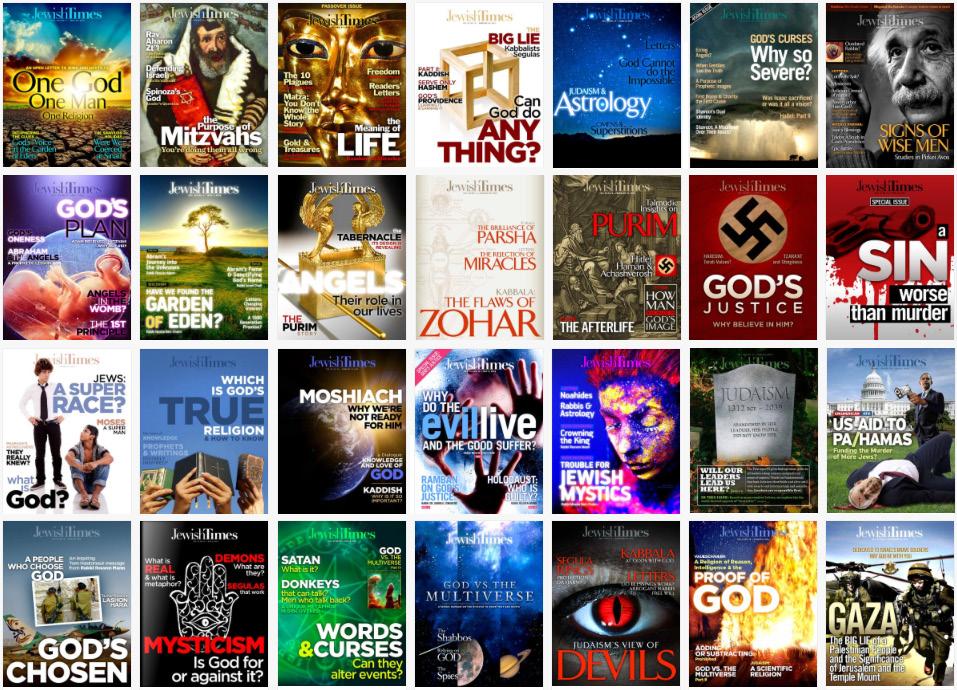
1 2 | WWW.MESORA.ORG MAY 19, 2023 Thought-provoking articles on Torah, Israel, science, politics and readers’ letters. 25 Years. 638 Issues Susbscribe FREE by emailing join@Mesora.org
Miracle Tablets
DANI ROTH
“There upon Moses turned and went down from the mountain with the two tablets of testimony in his hand, tablets written from their two sides: from this side and from that side they were written” (Exod. 32:15).
When Moshe received the Luchot, it specifically mentions that they were written on both sides. Why was this an important feature of the Luchot? Wouldn’t one side be su cient to communicate God's commands?
Furthermore, couldn’t Moshe make the inscriptions on both sides himself? If he could inscribe them himself, what's the proof that the Luchot were made by God?
We can answer both questions as follows. Our passuk can mean not that they were “written” on both sides, but rather that they were “legible” from both sides. Meaning, that as the Luchot were made from translucent sapphire, one could see the text from both sides. The key point is that the text was embedded “inside” the Luchot, not scratched upon its surfaces. Something like this could never have been done by man. This shows that God communicated Torah in a miraculous divine manner.

This theory is supported by the very next pasuk that says that the writing was “The writing of God.” Meaning, this writing was impossible to be created by a human. ■
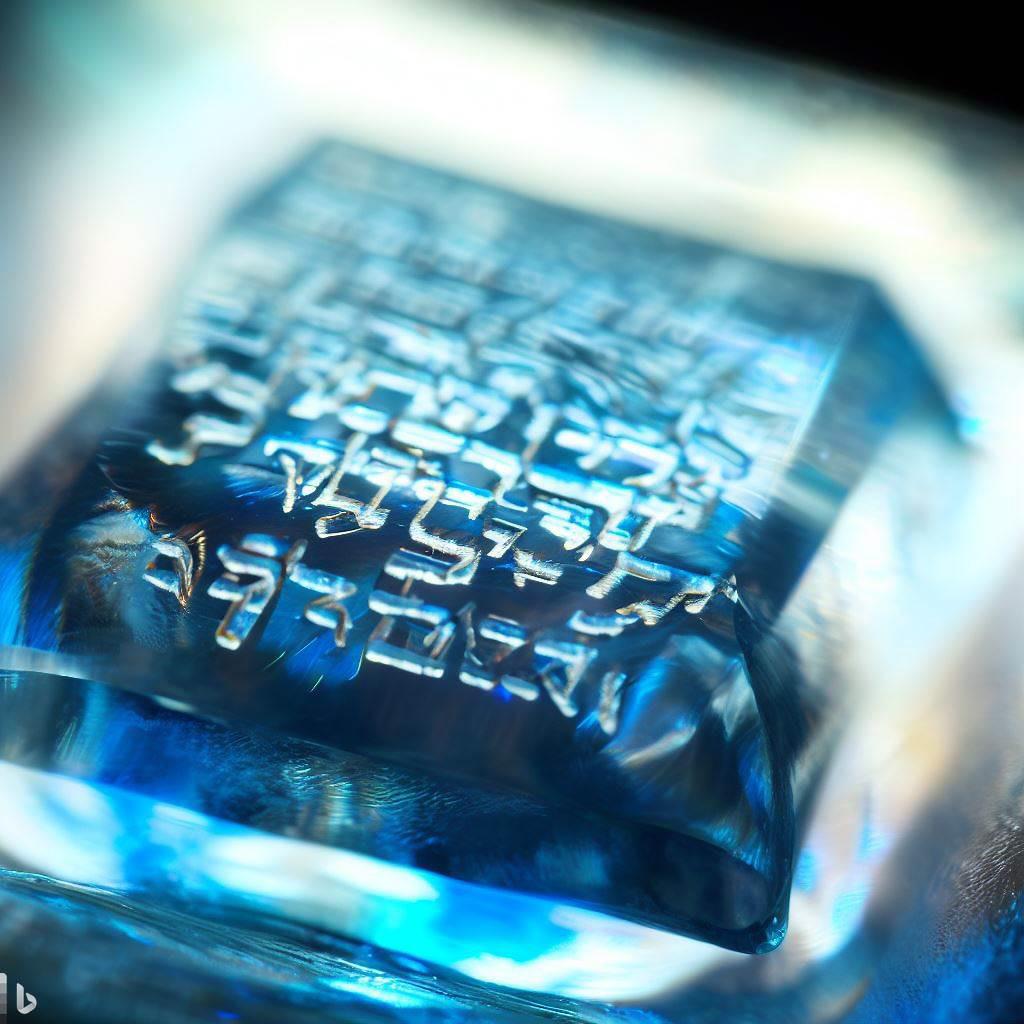
WWW.MESORA.ORG MAY 19, 2023 | 1 3 SHARE
SHAVUOS
Idolatry &Israel
Can a man make gods for himself? But they are not gods! (Jer. 16:20)
Jeremiah critiques idol-making, exposing the idol’s need for man to create it. How then does man need and pray to that which in fact needs him? Metsudas Dovid comments:

And is it fitting that man with the work of his own hands, make a god for himself? Are not humans non-gods, so how can the work of their hands be better than they themselves?
Jeremiah continues:
You will forfeit by your own act, the inheritance (Israel) I have given you; I will make you a slave to your enemies in a land you have never known. For you have kindled the flame of My wrath which shall burn for all time (Ibid. 17:4).
The purpose of Israel is to teach the Jews’ monotheism. Placing the Jew on the world stage through Jews dwelling in one location—Israel—God wishes the world to know the truth, exemplified by Jews, who follow Torah. But when the Jews abandon God and follow idolatry, Israel no longer has a purpose and the Jews are ousted. This is the message also contained in our Shema prayer:

Take care not to be lured away to serve other gods and bow to them. For God’s anger will flare up against you, shutting up the skies so that there will be no rain and the ground will not yield its produce; and you will soon perish from the good land that God is assigning to
Jeremiah continues:
Thus said the Lord: Cursed is he who trusts in man, who makes mere flesh his strength, and turns his thoughts from the Lord (Ibid. 17:5).
At the core of idolatry is man’s need for man. It is our childhood, where we were dependent on parents, that we learn the feeling of authority, a superior being. If one matures intelligently, he eventually abandons his view of his parents as being superior, and recognizes that all men and women equals. Some people however remain with an infantile mindset, and when realizing their parents are equal to them, they sense a void, and they invent a replacement of their childhood authority figure expressed in deifying Jesus, rebbes, or praying to stone and wood gods. These are all replacement figures for their parents. ■

1 4 | WWW.MESORA.ORG MAY 19, 2023 SHARE (CONT. ON NEXT PAGE)
PROPHETS
RABBI MOSHE BEN-CHAIM & HOWARD SALAMON
Don’t Count the Levites
Rabbi Eliezer Barany
Separate Count
This week’s parsha begins a new book, the book of Bamidbar. The beginning of the book speaks of a census that Hashem commands Moshe to take of the people. As the above passuk states, the tribe of Levi was not included in the census. They will be counted, but it will be separate from the census taken for the rest of Bnai Yisrael. The obvious question is, why would the tribe of Levi utilize a separate census? To that, Rashi responds with two di erent interpretations from our sages:

ONLY YOU SHALL NOT NUMBER THE TRIBE OF LEVI — The legion of the King is worthy to be numbered by itself (cf. Midrash Tanchuma, Bamidbar 15). — Another explanation is: The Holy One, blessed be He, foresaw that a decree would be made against all those that had been numbered from twenty years and upwards, that they will die in the wilderness (Numbers 14:29). He therefore said: Let these (the Levites) not be included amongst those now counted, because they are Mine, since they did not sin by worshipping the golden calf (cf. Bamidbar Rabbah 3:7; Bava Batra 121b). (Commentary of Rashi on Sefer Bamidbar 1:49)
As noted, two di erent interpretations are given. The first one explains that the tribe of Levi is unique, they are the “legion of the King.” As such, they merited their own count. The second answer provided explains that God knew that in the future there would be a decree on the people of this census of Bnai Yisrael that they would die in the wilderness. So therefore, Hashem wanted to keep the tribe of Levi separate so they would not be included in that decree.
Decree from God
There seem to be some issues with these two interpretations quoted by Rashi. Hashem apparently wants to save the Levites from the same decree that will be issued on the rest of Bnai Yisrael. It seems like the decree is totally separate from Hashem, like it has nothing to do with Him. However, where did this decree from? It came

SHARE (CONT. ON NEXT PAGE) WWW.MESORA.ORG MAY 19, 2023 | 1 5
(CONT. ON NEXT PAGE)
Do not on any account enroll the tribe of Levi or take a census of them with the Israelites. (Sefer Bamidbar 1:49)
PARSHA
from Hashem! Why does it seem that this decree is totally unrelated to God? Couldn’t He not make a decree on whomever He wants?
Then, it seems that the only way to save the people from this decree was to have a separate census. So what will the first explanation do with this requirement? The first explanation needs to take into account the fact that the tribe of Levi did not die out in the desert. Apparently that explanation was not concerned about the tribe of Levi being included in this decree.
Di erent structures
If we take a look at the di erent countings, that of the Levites and that of the rest of Bnai Yisrael, we see that there are some di erences. The Levites are counted from age thirty and up, while the rest of Bnai Yisrael are counted from the age of twenty and up. In describing the counting for the rest of Bnai Yisrael, the counting is described as having each person being counted, or each head being counted, whereas by the counting of the Levites, the people are counted by their houses and families. In fact, their counting was specifically related to their service in the Mishkan, as the Torah states:
All the Levites whom Moses, Aaron, and the chieftains of Israel recorded by the clans of their ancestral houses, from the age of thirty years up to the age of fifty, all who were subject to duties of service and porterage relating to the Tent of Meeting. (Sefer Bamidbar 4:46-47)
Immediately after the command to not incorporate a count (ti od) of the Levites with the rest of Bnai Yisrael, the Torah says to appoint (ha ed) the Levites to work in the Mishkan. Then, later on when the Levites are counted, their count is in the midst of their roles in the Sanctuary. In general, what is the terminology of pakod, or counting or appointment?

The Ramban explains:
TIPHKEDU OTHAM. The term p’kidah is an expression meaning remembrance of and attention to a certain matter, as in the phrase, And the Eternal ‘pakad’ (remembered) Sarah as He had said, and this in my opinion is its interpretation in all places, without any exception. (Commentary of Ramban on Sefer Bamidbar 1:3)
The Ramban explains that pakod shows that certain attention is given to the matter. Therefore,
the people were given attention by being counted and the Levites were given attention by being appointed to their positions in the Mishkan. As such, the Rashbam tells us that the Levites were not included in the other count because the rest of the tribes had a counting for who would serve in the army. However, the Levites would be counted to serve in the Mishkan.
So upon their counting, Kehat from the tribe of Levi is counted from age thirty and up and appointed to watch the most sacred objects of the Mishkan, as they cover the objects when they are being moved. Gershon, from the tribe of Levi, is counted from age thirty and up and their job of carrying the coverings is listed. Merari from the tribe of Levi is counted from age thirty and up and directed to carry the parts of the structure of the Mishkan. So it seems their countings are of completely di erent purposes, and substances. It seems that the counting of the Levites was supposed to accomplish something else.
Looking at the midrashim
If we look more at the midrash Rashi quoted, the midrash asked why all the Levites merited entering the Land of Israel. To which it responds that just as they were all righteous in Egypt, so they were righteous in the desert as they gave over of themselves to Hashem during the time of the Golden Calf. The midrash ponders and tries to figure out how we know that the tribe of Levi entered the Land of Israel, because the passuk says, “Not one of them survived, except Caleb son of Jephunneh and Joshua son of Nun.” The implication of this passuk is that no one but these two survived, including the Tribe of Levi. However, we know that Elazar the son of Aharon entered the land. So therefore the midrash concludes, that since Bnai Yisrael will not be entering the land and the Levites will be entering the land, therefore two separate counts should be done. As such, the Levites will not be included in the group of Bnai Yisrael who will die out in the desert.
What is interesting is that the midrash seems to have the opposite of the cause and e ect that Rashi had. Here it seems that the Levites merited a di erent count because of who they were and what they did, so they should be protected from the decree. As such, God instructed Moshe to give them a di erent count. Meaning that they did not merit destruction, so Moshe instructs him to count them di erently. However, the way Rashi presents it, it seems that the Levites would receive a di erent count in order to avoid the decree.
1 6 | WWW.MESORA.ORG MAY 19, 2023 SHARE (CONT. ON NEXT PAGE)
PARSHA
If we look directly at the first Midrash quoted by Rashi, we see that the midrash tells us that the Levites merited to not be destroyed because of their actions; they stood up for God at the incident of the Golden Calf. As such, they merited their own count. So how does this seem di erent from the other midrash? They seem to both be saying that the Levites were di erent because they stood up for God and they merited their own count. So why did Rashi quote both?
Separate or separating?
If we see how Rashi lines the midrashim up and contrasts them, we see that the first midrash is telling us that the Levites were a di erent people; they are the legion of the King. However, the second midrash seems to say that the Levites are at least somewhat part of the rest of Bnai Yisrael, so they needed to be separated. Obviously Levi is one of the sons of Israel, they are Jews as well. Yet, the tribe of Levi has its own name, its own function; they do not receive a portion in the Land of Israel because God is their portion. So what is being highlighted here?
It seems that the first midrash is explaining that the tribe of Levi was a distinct group of people. As such, they merited their own count. This count would not protect them from the decree, because they didn’t need protection! They were not a part of the people who were involved in the sin of the Golden Calf.
Apparently the second midrash is explaining that while the tribe of Levi were a di erent group of people, they were still part of the people of Israel; they were still connected. Therefore, by creating their own count, the Levites became a new, separate entity. According to the second midrash, the Levites were still being influenced by the other tribes and needed to become their own entity. So God tells Moshe to separate them. They should not be brought down by the sins of the others. Their name should not be associated with such an action. They needed a push, but they merited intervention for that push to ensure their continued authentic service of God.


Both answers agree that it was due to the actions of the Levites that they merited being saved from the decree to die out in the desert. Their count is solely associated with their service in the Mishkan. They were clearly servants of the Lord. That is what protected them from the decree. However, what the count accomplished was either that t revealed that the Levites were a di erent group or it severed the attachment of the two groups. Either way, they merited avoidance of the decree because they were a separate group. Either through their own accord or with the assistance of Hashem.
Sometimes in life we could be totally separated from certain bad influences. However, we shouldn’t think that just because we are doing certain things appropriately that we need not worry about our influences. Rashi is highlighting for us that we often need to acknowledge that we need to separate ourselves from some negative influences in order to reach our potential. Otherwise, our good deeds may get railroaded, and we may turn into a di erent direction. Please God we should merit the opportunity to work on ourselves and avoid destructive behavior. ■
WWW.MESORA.ORG MAY 19, 2023 | 1 7 SHARE
PARSHA
2 MUST READS THIS SPRING
Tohar Hayihud is a masterpiece of intelligent Torah thought. The Rabbi cites authentic Torah sources, Rishonim and great minds who, over the centuries, have rejected Kabbala’s claims as contrary to Torah.



Free to download: www.mesora.org/toharhayihud.pdf

Mezuzah: Protective Amulet or Religious Symbol? addresses the popular belief in segulahs and protective devices. Martin L. Gordon refers to Torah and reason as the authorities on true Jewish concepts.
Free to download: www.mesora.org/mezuza-gordon.pdf
1 8 | WWW.MESORA.ORG
FUNDAMENTALS
MESORA












SHARE Azamra Weddings LESS IS MORE! Embracing the More Authentic Post-Pandemic Reality A Real DJ for Real People JEFF NECKONOFF 516-771-9388 AZAMRADJ.COM


2 0 | WWW.MESORA.ORG MAY 19, 2023 SHARE HOME REPAIR DONE RIGHT! (347)489-2048 B B G HANDYMAN &POWERWASHING SERVICES • Competitive Prices • Fully Insured • 20 Years Experience • Free Estimates BEFORE AFTER BEFORE AFTER ALL HOME IMPROVEMENTS SERVING ORANGE COUNTY, NY www.BBG HandymanServices.com Special! Vinyl Siding Powerwashing $225.00 includes algae, mildew, and mold treatment (high ranch bi-level homes) Deck Powerwashing & staining $100.00 o total price





















































